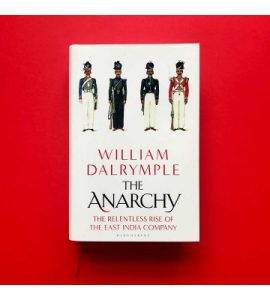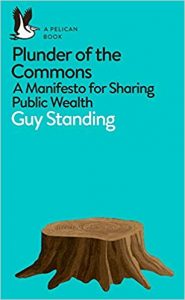Reviews
Imperial plunder

The Anarchy: The Relentless Rise of the East India Company. William Dalrymple, Bloomsbury, 2019
Of all the many Indian words which have entered the English language (bungalow, dungarees, khaki, pyjamas, etc.), one of the first was Hindustani slang for plunder: loot. By the late eighteenth century it was in common usage in Britain. Its introduction can be directly attributed to the East India Company (EIC), founded as a joint-stock company in London in 1600. The creation of joint-stock companies played an important part in the early stage of British capitalism. Merchants and other businesses could accept investors who had the cash but were not involved in the running of the business. Shares could be bought by anyone and their price could rise or fall depending on demand and the success of the business. The EIC started as a trading company, mainly with India, but with investors eager for dividends it took on a more aggressive role. By 1765 it had become so powerful it overthrew India’s Mughal Empire, and began the systematic looting of that country using its own private army. At 200,000, it was twice the size of the British army, and had more firepower than any state in Asia.
According to Dalrymple’s detailed study, by the late eighteenth century the EIC had become ‘the most advanced capitalist organisation in the world.’ It ruled most of India from a boardroom in the City of London, and Robert Clive was its manager in India. Dalrymple describes him as ‘a violent, utterly ruthless and intermittently mentally unstable predator’. But he was successful in enriching its investors. Clive returned to Britain with a personal fortune, then valued at £234,000, making him one of the richest men in Europe who had not inherited wealth. He transferred to the EIC £2.4 million (about £262 million today), seized from the Bengal treasury.
The EIC’s reach was global. To the east it transported opium to China, and in due course fought the Opium Wars in order to secure its profitable monopoly in narcotics. To the West it shipped Chinese tea to America where its dumping in Boston harbour triggered the American War of Independence. One of the principal fears of those who wanted independence from British rule, in the run up to the war, was that the EIC would loot the Americas in the same way as it had done India.
The East India bubble soon burst after the looting and the resulting famine in India led to massive shortfalls in revenue. Huge debts accrued and the Bank of England had to bail out the EIC with a series of loans, culminating with a request to the British government for £1.4 million in 1772 (£147 million today). As the EIC generated nearly half Britain’s trade, it was judged to be too big to fail. As Dalrymple puts it, ‘the world’s first aggressive multinational corporation was saved by one of history’s first mega-bailouts’. As a result of this bailout a process of state interference began in the running of the EIC, ending with its nationalisation in 1858. Having served its purpose in establishing a large part of Britain’s empire, the EIC was dissolved in 1874 and its remaining functions transferred to the British state. As Edmund Burke wrote: ‘The Constitution of the Company began in commerce and ended in Empire’.
LEW
Commons Blunder

Guy Standing: Plunder of the Commons: a Manifesto for Sharing Public Wealth. Pelican £9.99.
In a Supreme Court ruling towards the end of last year, an open space in Lancaster lost its status as a village green, on the grounds that the fields might be needed for the expansion of the local school (Guardian online 14 December – bit.ly/2tjWx8c). One campaigner said, ‘this judgment totally redefines the way we understand land held in the public domain’. This is just one example of the kind of development discussed in Guy Standing’s book, which in some ways complements Brett Christophers’ The New Enclosure, reviewed in the January Socialist Standard. Rather than just looking at the selling-off of state-owned land, it examines many examples of the privatisation or commercialisation of ‘the commons’, described as ‘all our shared natural resources … and all the social, civic and cultural institutions that our ancestors have bequeathed to us’.
As this suggests, different types of commons are identified. The natural commons consists of land, minerals, forests, rivers, sea, air, sky, while the social commons comprises public housing, healthcare, roads, public parks and so on. The civil commons is not so clearly defined, but includes the rule of law, justice and personal freedom. The cultural commons includes libraries, museums, mass media and sport, and the knowledge commons covers information, ideas and learning. In all these areas, there have been many examples of enclosure, such as cuts to the funding of national parks, the privatisation of water supplies and much of the NHS, the selling of allotment sites, the closing of libraries, and the domination of Google in providing information. Much of this material has been written about elsewhere, of course, but it is useful to have it summarised in a single volume.
Standing’s solution to all this is to propose a Charter of the Commons, which, for instance, contains statements such as ‘Farm subsidies based on the amount of land owned should be abolished’ and ‘Local markets selling fresh and local produce should be encouraged and protected’. A Commons Fund would be financed by a levy on all use of the commons, by a tax on wealth, land value taxation and a carbon levy. It should pay Common Dividends to everyone, thus constituting a basic income. But these ideas might equally well be summarised as ‘Capitalism should be run as a nice friendly system’.
One article in the proposed Charter is: ‘Privatized water companies must be restored to common ownership’. This reveals one of the problems with the whole concept of the commons employed here. Ownership and control by the state (whether of water or the railways or whatever) is emphatically not common ownership, as people still need to pay to have access to them. Standing writes: ‘our public wealth has been plundered by encroachment, enclosure, commercialization, privatization and colonization of Britain’s commons’: but it was not public wealth in the sense of being owned by the people. Common ownership implies an end not just to privatisation but to wage labour, production for profit and the class division of capitalism.
PB
